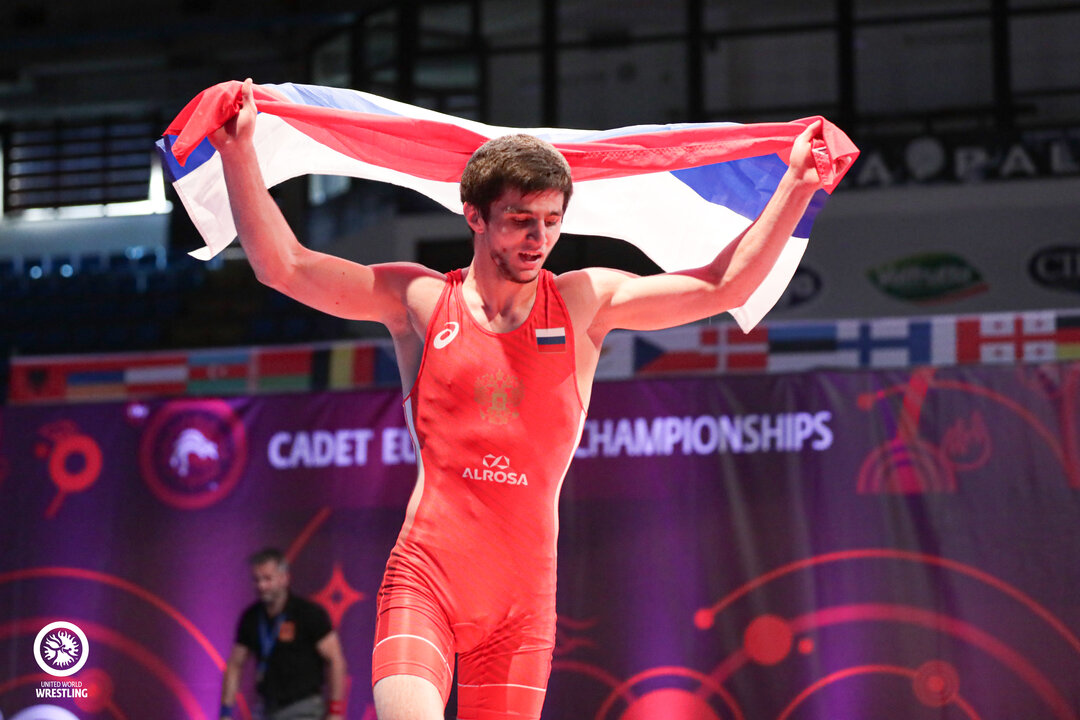Azerbaijan Reaches Top of European Podium Twice on Day 2
Tuesday, June 18, 2019 - 19:13 By Eric Olanowski

FAENZA, Italy (June 18) – Azerbaijan, led by Malik ALIYEV (AZE) and Nihat MAMMADLI (AZE), won a pair of Day 2 gold medals and head into the final day of Greco-Roman wrestling trailing first-place Russia by 23 points.
The first Azerbaijani wrestler to claim the 25 first-place points was Malik Aliyev, who won the 48kg title by scoring five unanswered points against Russia's Damir KALAKUTOK. In the finals, Aliyev surrendered an inactivity point and a gut wrench and trailed his Russian opponent, 3-0.
The tides quickly turned when the Azeri compiled five quick points. Aliyev scored his first points with an arm drag takedown, then coupled that with a gut wrench to gain the 4-3 lead. He then racked up another point from a quick stepout and transitioned into the second period with the 5-3 lead. A scoreless second period ended the match with the same score that started the second period, 5-3, giving Aliyev his first continental title.
The second Azeri to win a gold medal on the second day of wrestling at the Cadet European Championships was 2017 world silver medalist Nihat Mammadli.
Mammadli quickly ended Hleb MAKARANKA's (BLR) magical European run with an 8-0 victory in the 55kg gold-medal bout. The Belarusian was coming off an opening day performance where he stopped defending European champion Dimitri KHACHIDZE (GEO) from reaching the top of the podium in back-to-back years.
In the short-lived 55kg finals, Mammadli struck first with a lightning-quick arm drag for the match's first takedown. The action was blown dead, and when the wrestlers got back to their feet, Mammadli secured double underhooks, and threw the Belarusian with a picturesque back arch and picked up four points. Now leading 6-0, Mammadli lifted Makaranka near the out of bounds lines and was awarded two points for the correct throw, and ultimately the gold medal with the 8-0 shutout victory.
Azerbaijan also collected 15 third-place points after Khasay HASANLI (AZE) bulldozed Nikoloz MARGVELASHVILI (GEO), 9-0 in the 65kg bronze-medal bout.
 Russia entered three wrestlers into the Day 2 finals but Imran BABOCHIEV (RUS) was the only one to reach the top of the podium. He won the 65kg title with an 8-6 over Muslim BARGA (TUR). (Photo: Kadir Caliskan)
Russia entered three wrestlers into the Day 2 finals but Imran BABOCHIEV (RUS) was the only one to reach the top of the podium. He won the 65kg title with an 8-6 over Muslim BARGA (TUR). (Photo: Kadir Caliskan)
Although Azerbaijan had the most champions on Day 2, they still trail Russia by 23 points heading into the final day of Greco-Roman wrestling.
Russia, who leads with 88 points, had three wrestlers vying for a gold medal on day two, but Imran BABOCHIEV (RUS) was the only one who came out on the winning end of things. Babochiev trailed Muslim BARGA (TUR) 6-0 before scoring eight unanswered points to take the 65kg title with an 8-6 victory.
Damir Kalakutok and Said MUSAEV (RUS) fell short in the 48kg and 110kg finals respectively, but still collected 20 second-place points. Russia also received 15 third-place points from Artem KOLESNIK (RUS) after he crushed Varuzhan ANTONYAN (ARM), 9-0 in the 55kg bronze-medal match.
Armenia rounds out the top-three in the Greco-Roman team race after the second day of wrestling. Armenia and Azerbaijan both have 65 points, but the Azeris hold criteria because of their two champions.
Wrestling resumes tomorrow in Faenz, Italy, at 11:30 (local time) and can be followed on www.unitedworldwrestling.org.
RESULTS
48kg
GOLD - Malik ALIYEV (AZE) df. Damir KALAKUTOK (RUS), 5-3
BRONZE - Karapet MANVELYAN (ARM) df. Anatoliy KOTYK (UKR), 6-2
BRONZE - Maksim STUPAKEVICH (BLR) df. Melkamu FETENE (ISR), 3-1
55kg
GOLD - Nihat MAMMADLI (AZE) df. Hleb MAKARANKA (BLR), 8-0
BRONZE - Dimitri KHACHIDZE (GEO) df. Eduard STRILCHUK (UKR), 5-1
BRONZE - Artem KOLESNIK (RUS) df. Varuzhan ANTONYAN (ARM), 8-0
65kg
GOLD - Imran BABOCHIEV (RUS) df. Muslim BARGA (TUR), 8-6
BRONZE - Dzmitry BONKA (BLR) df. Arman KHACHIKYAN (ARM), 5-1
BRONZE - Nikoloz MARGVELASHVILI (GEO) df. Khasay HASANLI (AZE), 9-0
80kg
GOLD – Vasile Daniel COJOC (ROU) df. Vigen NAZARYAN (ARM),
BRONZE - Alexander JOHANSSON (SWE) df. Gabriel LUPASCO (MDA), 9-7
BRONZE - Jonas Kjeldgaard MOELLER (DEN) df. Umut CELEM (TUR), 10-3
110kg
GOLD - Mate GOKADZE (GEO) df. Said MUSAEV (RUS), 8-0
BRONZE - Mykhailo VYSHNYVETSKYI (UKR) df. Razmik KURDYAN (ARM), via fall
BRONZE - Omer AYGUL (TUR) df. Adolf BAZSO (HUN), 6-1


 Iran's national Greco-Roman coach Hassan RANGRAZ during the 2024 Paris Olympics. (Photo: United World Wrestling / Jake Kirkman)
Iran's national Greco-Roman coach Hassan RANGRAZ during the 2024 Paris Olympics. (Photo: United World Wrestling / Jake Kirkman)
Share your thoughts.
Comments